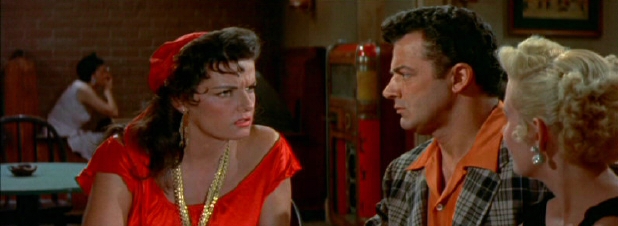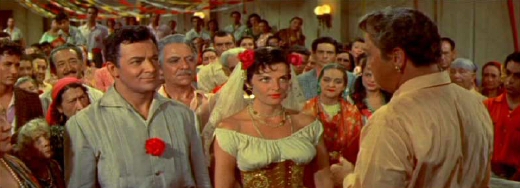
SECOND CHANCES
christopher funderburg
NICHOLAS RAY: Part IV
page 3
Hot Blood

Watching Hot Blood it finally clicked: many of Ray’s films are enjoyable camp. And I want to be clear about what I mean by that: in Artists in the Audience, Greg Taylor's interesting study of the film critics Manny Farber and Parker Tyler, he makes the distinction between "camp" and "cult" films. Both types are acknowledged to by their fans to have certain flaws - an awkward aesthetic or a morally dicey perspective or an inconsistent tone or any number of problems. And these flaws are not a minor characteristic of the film in the way that, for example, Dennis Weaver's terrible performance in Touch of Evil is a small problem, all things considered - but the flaws of camp and cult films are without a doubt prominent.
With a cult film, the audiences loves the work in spite of these flaws - a cult appreciation overlooks wobbly sets, variable performances, ugly photography, poorly recorded sound etc. excusing them as the result of an inadequate budget, misunderstood auteur undercut by meddling studios or some other factor. No one would cry if these problems could be removed from a cult film - they're effectively standing in between the audience and the intelligence or originality or otherwise greatness flashed by the movie. Think of films like The Re-Animator, Primer, They Live and Trust.
With a camp film, on the other hand, the flaws are the whole show: if you remove the awkward bits, the stupid dialog, the bad costumes, the overwrought plotlines, the ill-considered lighting, all of the moments of bizarre and strange and bad filmmaking, the film would be of no interest. A camp film is interesting precisely because of the boggling cinematic miscalculation on display. In this category, we have films like Troll 2, Plan 9 from Outer Space, The Room and Mommie Dearest.
The hardest to categorize are the hard to deal with films that straddle this line, the infamous "intentionally bad" films like Starship Troopers, El Topo and The Rocky Horror Picture Show. These films essentially split the difference: a third of the admirers of Jodorowsky will tell you he's an out-and-out genius while the another piece will tell you his films are amazingly retarded while yet another segment of his fans would try to blend the two poles, he's a genius who creates works of sublime idiocy or that his films are works of genius made by an idiot.
At first, it might seem completely unfair to exclude Ray from that third category blending the cult and camp - I think a lot of Ray's defenders explicitly locate the pleasures of Johnny Guitar and Bigger than Life along those lines. Certainly, Truffaut's essays on those two films seem to be circling that idea: his language in discussing them alternates between positive and negative. In his Johnny Guitar review, he categorizes Ray as being "in the school of sincerity and sensitivity... an intellectual who can abstract everything which does not come from the heart." Words come up over and over: beautiful, poetic, poet, poetry, best. But at the same time, the film's flaws - "strangeness," "ridiculously" accented cowboys, "theatricality" - attract Truffaut in equal measure. The argument is clear: Johnny Guitar might at first glance appear to be an awkwardly, stilted, cheesy, ridiculous film, but those are intentional tactics employed by the director achieve poetry.
I don't buy it, though. Seeing a film like Hot Blood makes me unwilling to cut the director any slack whatsoever: it's just a completely gawd-awful movie. A lame-brained ethnic comedy about a crazy gypsy marriage - so crazy, it just might work! - Hot Blood is a thin, stinky stew of idiotic, unfunny stereotypes, stillborn plotting, stage-bound settings and outright terrible filmmaking that plays like an ugly, meat-headed version of Frank Tashlin - all of the grating, broad, puerile comedy of The Girl Can't Help It! with none the cinematic inventiveness, charm or intelligence. An exceptional intellectual or emotionally dishonesty would be required to use words like poetry or beauty to defend this ridiculous, theatrical film. The strangest thing about it is that critics don't immediately dismiss it as My Big Fat Greek Wedding's obvious ancestor.
The plot follows barrel-chested and frequently shirtless gypsy-dancing superstar Cornel Wilde through the trials of an arranged marriage to conniving con-artist Jane Russell.* She has a change of heart after her family scams the big lug - she wants to make it work, but he dreams of pursuing a life on the fancy-dancing circuit with his blonde girlfriend. It's like a dullard Barbra Stanwyck facing off against a greasy, grace-deficient Gene Kelly. Just two modern day urban gypsies fighting over love, money and family in a tradition-bound culture that has no use for the professional dance circuit or attractive yet trashy RV dream-homes. I won't bother you with the details of the plot because the film clearly doesn't give a shit: its ridiculous plot and ham-fisted reversals are tossed off with an apathy belied by its insulting lack of narrative logic or impetus for emotional investment. It's paint by numbers all the way and Ray can't even be bothered to keep his crayons inside the lines.
Another major problem for the film is that Cornel Wilde is no Gene Kelly - he can't dance a lick, so the three or so extended scenes of fleet-footed gypsy-hoofing are covered by a stunt double. Call it the Kill Bill problem: one of the reasons the climatic fight at the teahouse is so ineffective in that film is that the director is constantly cutting around the fact that Uma Thurman can't perform any of the complex martial arts required for the battle. The physical movements of talented performers will always be more invigorating and exciting than any cinematic technique amplifying them - there's an obvious reason that Jackie Chan and Fred Astaire are stars: they're a pleasure to watch and no amount of quick-cutting and colored filters could ever upstage them. A stunt-double is somewhat a pleasure to watch, but far less so than having an actor who can perform with grace and fluidity and power. And the filmmaker can try to hide the double, but the audience can always smell the fakery. Just ask Rossellini: two souls in one body is heresy and I wouldn't mind burning at the stake cinematic heretics who try to pass off phonies for the real deal.
So, the dance sequences - which are the only thing in the film that would ever be able to even theoretically redeem the moronic melodrama, sentimentality (over a main character's terminal disease, no less) and ethnic high-larity on display - actually end being the most intolerable element of this whole pseudo-musical. Many of the film's most important scenes revolving around Cornel Wilde's character dancing and the camera hides in close-ups most of the time: shots of rapidly tapping tootsies intercut with images of Wilde's strained, serious face. The dance-doubles are graceful and effortless fluid in their every gesture while Wilde's expression makes him look like he's fighting through a priapism.
To top it all off, the film employs some positively Austin Powers-esque placement of objects between the dancer and the camera to conceal the double - a garbage can here, an over-sized novelty hat there. It's hard to say if those moments are more irritating than when Ray simply sits the camera in a static, ultra-wide shot with the tiny figure of the gypsy dancing way off in the distance. It's hacky, it's dumb, it's ineffective, it's embarrassing. Those techniques suck during the tedious dance sequences (they are, of course, the sources of the tedium), but it's even worse during the traditional gypsy belt-fight at the climax of the film.
When Wilde's character squares off against his older brother (played by Luther Alder), we're treated to an awful, awful, awful mess of uselessly tight close-ups, amateurishly choreographed medium shots, Austin Powers-blockages and ultra-wide shots. I just stumbled across a hilariously overblown review on The Auteurs website** by Evan Davis that describes the painfully lame belt-battle as "a balletic, choreographed duet." Every time I want to cut Ray some slack, I'm treated to that type of garbage and I just can't let him off the hook. Without hesitation, I can honestly say that the gypsy-belt-showdown ranks among the worst "action" sequences I have ever seen, somewhere on the level of the one in which Dr. Wes McLaren very gently pushes a man through a hospital wall in The Patriot.

And the accents! Steven Seagal's penchant for Cajun slurring and hip-hop slangin' is masterful compared to the cavalcade of hammy enunciations parading through Hot Blood. The film takes place almost entirely within an urban gypsy community and the implication seems to be that every character hails from the same rarely mentioned European "old country."*** That doesn't explain why a good portion of the characters speak in a Speedy Gonzales-esque patois while many others deliver their lines somewhere between Jackie Mason and a stereotypical dego. Russell's faint accent of indeterminate origin surprised me every time she remembered to use it for a line or two, while Wilde admirably doesn't alter his speech one bit. But bad accents are a criticism that can be made of just about any older Hollywood film featuring "ethnic" characters and, hell, some vaunted directors even built a career out of it - where would Orson Welles be without his ridiculous brogues in Macbeth and Lady from Shanghai or Charleton Heston's Charleton Heston-esque accentless Mexican in Touch of Evil?
Bad accents aside, the final problem is this: a film like Hot Blood ruins any ability I have to give Ray the benefit of the doubt as an artist. If you remove the flaws of Hot Blood, you're left with nothing at all and any attempt to find good in the film is grasping at straws. Jeez'um crow, I expected it to be years before I saw a worse movie than Wind Across the Everglades, but then it turns out there's (at least) one in the damn Ray series! The only way in which Hot Blood can be enjoyed is on the camp level. Look, Godard spells it out in his review, "A success almost in spite of its director, I should add." What could fit the definition of camp more clearly than a film with virtues derived in spite of its maker? Is this the way that one has to approach Ray to love his films? Can the true appeal of Johnny Guitar, Hot Blood, Wind Across the Everglades, Bigger than Life, The Lusty Men, Party Girl, Knock on Any Door and any of his other obviously mediocre work simply be of the dreaded "so bad, it's good" variety?
* Because of her marriage to Bob Waterfield (the clown who usurped Sonny Jurgensen), I always had a distaste for her. Her only (believable) expression is that of bovine confusion.
** Despite that quote, the Auteurs website/company/dvd service is awesome - I don't want to insult it any more than I would accidentally want to insult the peerless Film Forum for doing the Ray series.
*** One character mentions Serbia as a homeland, but the main characters are named Torino, which doesn’t sound very Serbian to me. I guess one of the defining characteristics of gypsies is itinerancy, so I'll readily concede that the film knows more about gypsies than I do and take its word on Torino and Serbia being compatable.
<<Previous Page 1 2 3 4 Next Page>>
home about contact us featured writings years in review film productions
All rights reserved The Pink Smoke © 2009